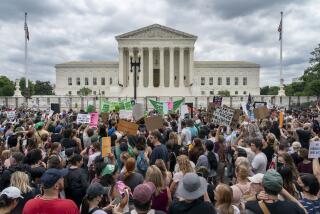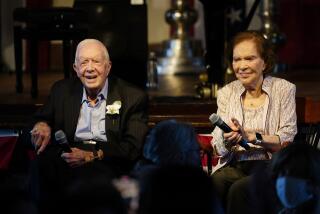Surgery for Very Elderly Poses Dilemma
- Share via
ATLANTA — A beaming Margaret Davis hugged her doctor and told him she could finally breathe again after her heart bypass and valve replacement.
It wasn’t an unusual scene--except that Davis was two months shy of her 99th birthday.
Doctors now are operating on patients once considered too old for the scalpel, but in this era of health care reform they face a dilemma: Are the costs and risks of surgery on nonagenarians worth the chance of prolonging life another year or two?
“This debate will grow and grow as the number of elderly people doubles in the next 30 years,” said Daniel Callahan, director of the Hastings Center, a bioethical think tank.
“Do we at the beginning of life put all our resources in very expensive cases like low-birthweight babies, or at the end of life with bypasses for people age 98?”
Rationing health care is not part of the Clinton plan to curtail increasing health costs.
Nonetheless, doctors, economists and patients are debating the issue as more of the nation’s very aged--mostly women--need surgery not to combat terminal disease but to replace worn-out body parts, according to Dr. Nanette K. Wenger of Emory University.
“The public says, ‘Wait a minute, you just spent $40,000 on very fancy surgery on a 98-year-old woman?’ ” said David Rothman, professor of social medicine at Columbia University.
“Physicians see this as another marvelous example of the wizardry of medicine. No physician is going to invoke the national budget as a grounds for denying treatment. Goodness knows most of us wouldn’t want them to.”
But they do grapple with whether an elderly patient will survive surgery well enough and long enough to make it worthwhile.
There’s little data on that, because doctors have operated on octogenarians for only about 12 years, and on nonagenarians for even less. One Emory study found that the very elderly survived heart-valve replacements as well as people in their 60s.
The key is measuring age biologically instead of chronologically, says Davis’ doctor. The calendar says Davis is Emory’s oldest heart surgery patient, but she has the physique of a 70-year-old, Dr. Joe Craver said.
“She’s active, she goes fishing, she plays bridge, she lives alone,” Craver said. “But just because it worked on her is not a license to operate on everybody. They have to have a good enough prognosis to make it worthwhile.
“You could apply this standard to a 40-year-old in bad condition.”
For Davis, the surgery in August boiled down to quality of life.
“My doctor said if I didn’t have it, I wouldn’t live over six months and it wouldn’t be an easy death, going in and out of the hospital. Would you have done that?”
Davis had her aortic valve replaced, a valve that calcifies with age until it can no longer regulate blood pumping through the heart. Doctors also did a double bypass to clear blocked arteries they might have treated with drugs had she not needed surgery anyway.
The West Point, Ga., woman spent nine days in the hospital, the time an average 65-year-old heart patient spends. Medicare and Blue Cross paid the $40,000 bill.
The American Assn. of Retired Persons says the elderly trying to fight terminal illness aren’t eating away medical funds. A recent study found Medicare paid $15,400 on 70-year-olds during their last year of life, but less than $9,000 for 90-year-olds, said AARP analyst Andrew Smith.
“But spending money on people who will live awhile longer--you can’t put a price on that quality of life,” he said. “A life is a life. If it’s the life of an 80-year-old, it’s not inferior.”
The nation will spend more money on that kind of surgery--replacing worn-out parts in otherwise fairly healthy elderly people, Wenger said.
“Most elderly patients say, ‘I have no problem if I’m going to die, but I don’t want to live with these symptoms.’ We can’t ignore that,” she said.
“Wasn’t it silly, an old lady like me?” Davis said, laughing. “But I can breathe now. I’m doing all right.”
More to Read
Sign up for Essential California
The most important California stories and recommendations in your inbox every morning.
You may occasionally receive promotional content from the Los Angeles Times.













